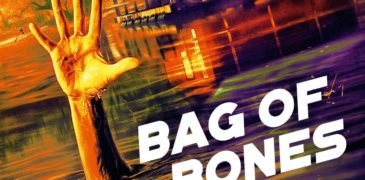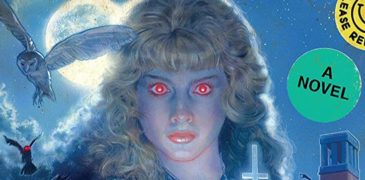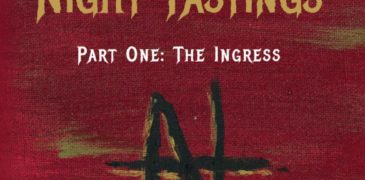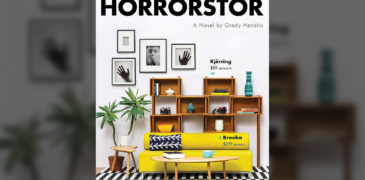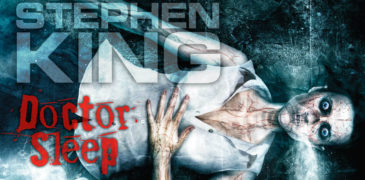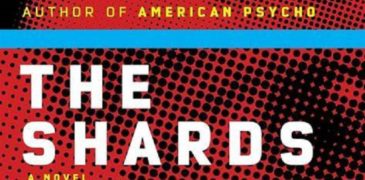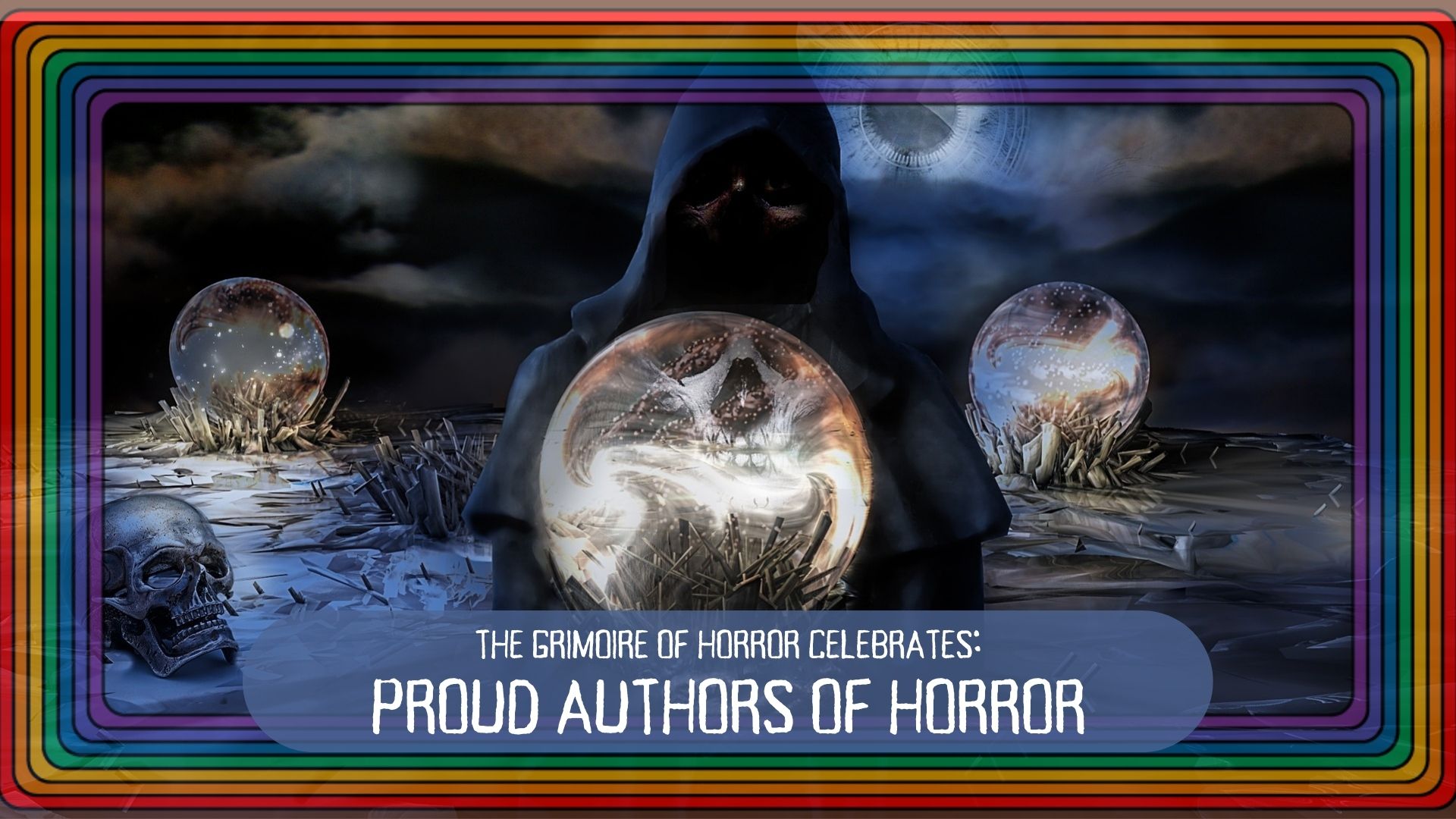
Celebrating Pride Month With LGBTQIA2S+ Horror
Authors From Around the World
It’s Pride Month, and we are thrilled to fly our flag along with these amazing horror authors who identify as LGBTQIA2S+ or who write queer horror. Take a look at our recommendations for some of the best horror writers in the industry; we even got to talk with some of them about life as a queer author in today’s world. We hope you discover some new authors to follow within this article, and that aspiring writers who read these interviews may find some courage through our featured authors’ words.
Love is love!
Interview with Dan B. Fierce – Author
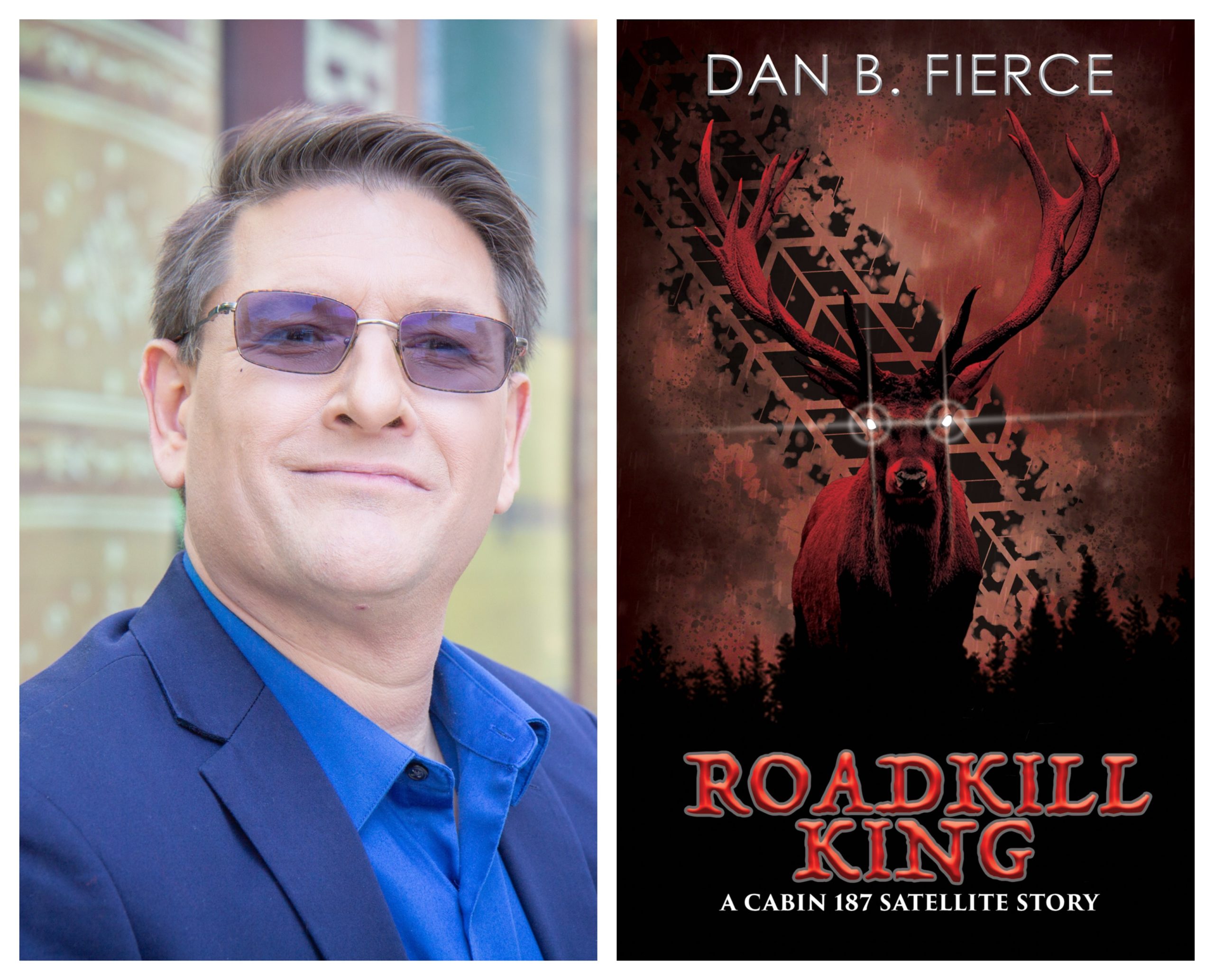
Dan B. Fierce loves humor and horror alike, and many things in between. A long-time fan of authors like Stephen King, Dean Koontz, and Edgar Alan Poe, he lets his darker side come out in the macabre Revenge, demonstrates the tension caused by the coronavirus with Mistaken, and gives the reader a taste of dark humor with Warning Shot all contained between the covers of the 2020 Indie Authors’ Short Story Anthology. His suspense-filled story Abandoned Bikes has published in Crimes and Culprits: An Anthology by the Indie Author Group. Both books were put out by Heathory Press. In 2022, he made his first solo short story publication, Roadkill King.
We were lucky enough to sit down with Dan B. Fierce for an interview!
Thank you for taking the time to tell us all about you and your work! First thing’s first: have you always loved horror?
Ever since I was a preteen, I have loved horror. With the rise of Stephen King’s popularity, Alfred Hitchcock movies, Ray Bradbury Theater, The Munsters and The Addams Family, Twilight Zone, and Edgar Allen Poe all molding my mind in my formative years, I have loved thrills and chills in my entertainment. Plus, growing up with the 80’s slasher flick boom didn’t hurt. I couldn’t wait to see which creative ways Freddy Kruger, Jason Voorhees, Michael Meyers, and Chucky would dispatch their victims.
You started young! What inspired you to write your first story?
I wrote my first horror story for a classmate who was struggling in English. It got such a great reaction from the teacher that I set it in the back of my mind that I could do that if I wanted to. Of course, I didn’t really follow up on it then, but creative writing always seemed to come easy for me. Fast forward to my years of E-fedding (think fanfiction for wrestling fans), I became more aware of the fact that I had some chops. Several years later, I decided to make an attempt at becoming a published author. In 2019, I participated in NaNoWriMo, getting almost sixty-five thousand words written within the span of a month. I’m still working on that manuscript, by the way. During that time, I met a gal who writes under the pseudonym of Mustang Patty. She was my first angel in the writing world, giving me so much encouragement and drive. After the hectic pace of November died down, she contacted me and asked me if I wanted to write some stories for her anthology. Once the pandemic hit, she changed up the theme to reflect the world we were living in, so I wrote Mistaken, Warning Shot, and Revenge. She accepted all three, and I was over the moon.
Has being queer had any impact on your ability to put your work out there? Have you had to deal with any homophobia?
You know, I have to say that I think I have been very fortunate. I haven’t knowingly encountered many roadblocks yet as an author, beyond the usual disappointment of rejections that all authors go through. Honestly, I think I have made my own opportunities through networking and such. Now, that’s not saying that it can’t or won’t happen to me, but if it has, the people responsible have had the good taste to not make it well known. I feel like I have truly been blessed in that I haven’t encountered any open homophobia during my attempt to get my author’s feet under me. Bear in mind that I’m still fairly new to this whole process, and I’m also self-published. I don’t have the patience for the hoop-jumping, hemming and hawing that traditional publishing entails. If I were to face homophobia in that case, I’d need heavier medication. And now I have an idea for a new story.
Let’s hope it doesn’t come to that! Do you write queer characters into your stories?
Currently, I’m still working on getting the basics under control. For the future, I do plan on putting much more needed representation in my works, but it is my personal opinion that LGBTQI+ characters should be treated just like any other character. They bleed, they feel, they are. Their sexuality and the sexuality of any of my characters is treated more ambiguous that as a plot point. Will I be writing queer characters? Absolutely. Do I have a lot of them in my stories right now? Not currently, but they are on their way.
Where have you found your fans?
Social media has been invaluable for me while building a fanbase, particularly Facebook and Instagram. Those are the two that I’m more familiar with. I’ve been trying to reach further by joining Tumblr, Twitter, DeviantArt, and the new social media strictly for horror lovers, Slasher. It’s a learning process, and for a codger like me, a long one.
Do you think being queer may prevent other writers from sharing their work for fear of homophobic backlash?
I would say that’s a good possibility. In a way, it’s very much akin to coming out of the closet. They could be very nervous about showing the world who they are, and how the world, and those they love around them, might react. It can be very intimidating. Maybe that’s the subconscious reason that I don’t have a lot of representation in my current works: I’m worried about the clapback of either getting it wrong or from those of a less accepting standpoint. What I’m quickly learning though, is that there is an audience for nearly everything, and that a good chunk of people are a lot more forgiving than our writer’s anxiety-addled brains will allow us to
believe.
Have you found a great resource online for queer writers that you would like to share?
I haven’t found a lot of LGBTQI+ specific groups yet, but there are tons of really fantastic writing groups out there that look past the author’s private life and support the author and their work. One thing that I love about the horror community is everyone’s willingness to help the other. This is particularly true of groups like Books of Horror, the HWA Facebook group, and the Get Writing Horror family of Facebook groups. I can’t recommend those enough for any author specializing in horror, no matter what your queerness status is or isn’t. That said, I’m positive that those groups exist out there. All you have to do is find the one that best fits your needs.
What is the most important message you would like to convey to newer authors out there who are trying to establish themselves?
Networking is truly important in this day and age. With social media becoming a larger slice of everyone’s life, it truly pays to learn what you can about utilizing social media as efficiently as possible. That doesn’t mean you have to take classes to do it. Join a group and lurk in the shadows, joining in on the conversations whenever you can. Join organizations like the Horror Writer’s Association, Horror Writer’s Guild, or a local or state writer’s organization. Go to critique groups and author events that you’re not involved in. Go to Comicons and horror conventions and interact with authors, publishers, and vendors. We’ve been locked down in varying degrees for over two years now. Get out of your house and mingle. It’s a vital skill, even if it can be intimidating or uncomfortable. We are humans. Without that face-to-face interaction, we spiral into madness. If the last two years have taught us nothing, it’s that.
Tell us about your next work in progress, or anything else you’d like our readers to know about your work.
I’m working on several things right now. The first is a collection of short stories called Cabin 187. It’s still in the drafting process, but the thing that will make this collection a bit more unique will be the fact that all of the short stories will be contained within a central story. The concept is about a cabin that traverses time and space to collect damned souls. I have many of the stories at least at the first draft level. Now I need to get the central story going. With any luck, it will be out by the end of this year.
I will also be releasing another “satellite” story, like Roadkill King, that is within the Cabin 187 universe called The Rose-Tinted Mirror. It’s a story about a husband and wife celebrating their fiftieth wedding anniversary by taking a honeymoon in the same cabin that they had their first one in. Inside, they find that the same mystical mirror from a half century ago is also there. Sometimes, the past should stay where it’s at.
The final project that I have going is the one I mentioned that I started in 2019 for NaNoWriMo, Killer Punchlines. Owen Wendell Napier is a stand-up comic with an especially hazardous problem; part of him is a serial killer. As he travels around to perform, his other side likes to come out to play. When he slays an audience, he really slays them. I’m anticipating that it should be released within the next year or so.
Wow! You have a lot going on! Thank you for spending some time with me and sharing your thoughts with our readers; I’m sure they’ll want to check out your work as much as I do! Now get back to that laptop, I want to read Killer Punchlines right now!
I really want to thank you for having me for this interview, Kate. For a fledgling author, opportunities like this are rare and very appreciated.
About Roadkill King, by Dan B. Fierce
“Everyone needs a hobby, but not everyone’s hobby involves blood, entrails, and… roadkill.
Tatum Johnson didn’t mean to hit the dog. His ex-girlfriend Jessica can attest to that. But that didn’t stop the hunger. Now, he hunts along the back roads, running down animals for sport. But on a night as pitch black as his soul, fate puts Tatum on a different road where new horrors await. On this night, Justice is served.”
This solo debut short story by horror author Dan B. Fierce is just a sampling of the horrors that will await the reader in the Cabin 187 series.
TRIGGER WARNING!
This short story depicts violence against animals. Don’t worry, though; they get even.
Follow Dan B. Fierce:
Facebook Instagram Twitter Tumblr DeviantArt Slasher Website
Interview with William A. Wellman
Author and Podcaster
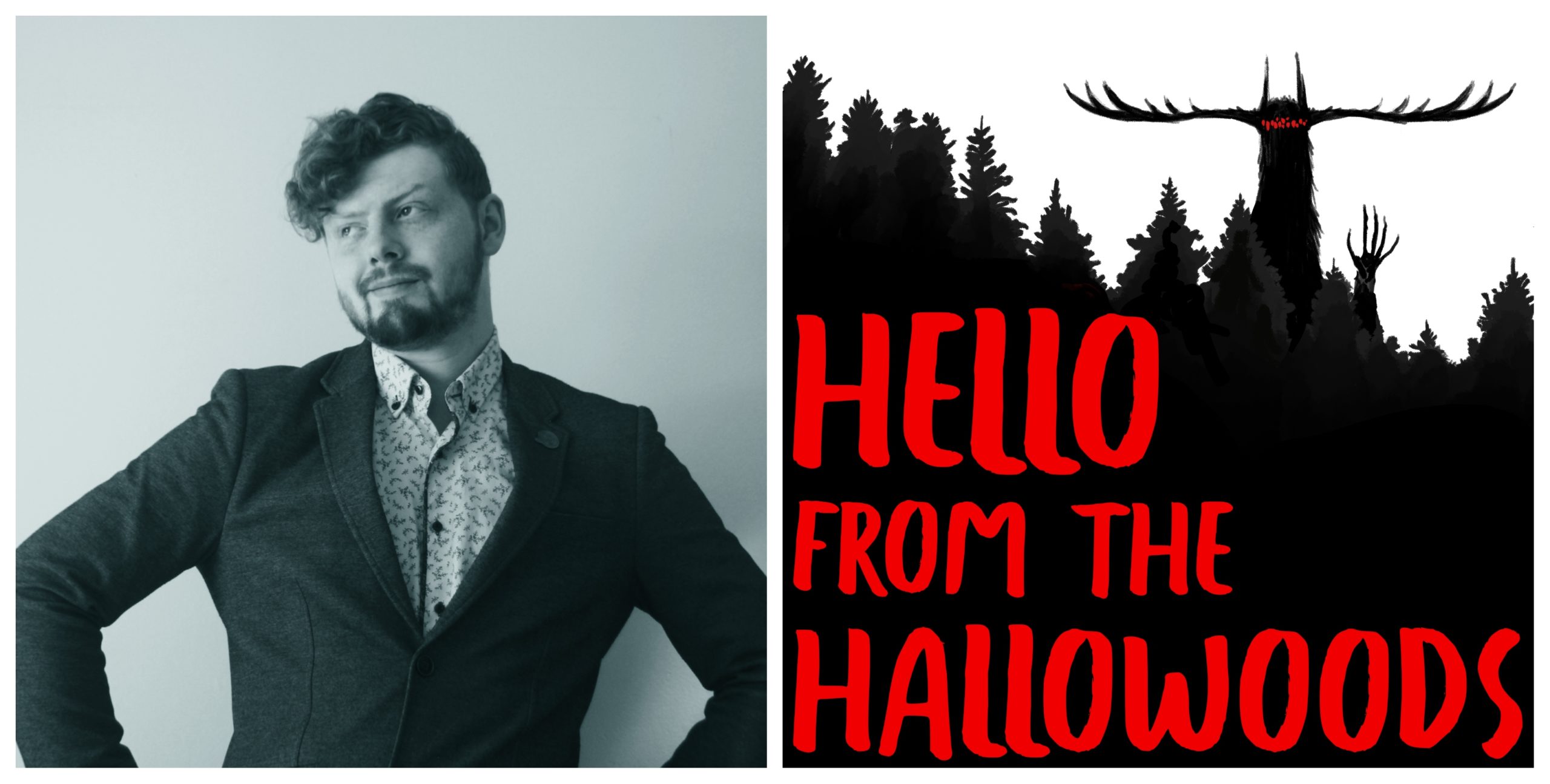
William A. Wellman is a nonbinary horror author who can be found wandering the cold eastern shores of Canada, looking for crab gods amidst the stones. After a series of misadventures which culminated in a business marketing degree, they’ve abandoned the daily grind to pursue a full-time career in writing gravely queer horror stories.
In addition to writing and voicing the weekly podcast, Hello From The Hallowoods, they have several short stories published in anthologies with Eerie River Publishing and are currently writing a Hallowoods tie-in novel. One Hundred Eyes In The Dark is expected for a 2023 release.
William took a break from his busy schedule to have a chat with us!
Have you always loved horror? What was the first horror book/movie that truly scared you?
I think the very first experiences I had with horror, and to this day some of the most memorable, were in watching the original run of the Twilight Zone as a young person. From the first episode I was hooked by Rod Serling’s solemn narration and the twists that show delivered so beautifully despite the low-budget, black-and-white medium. I think Rod’s magnus opus still lives up to this day.
Some of the episodes that scared me the most were also the ones that had the most to say about fear, or loss, or the human condition – Nothing in the Dark is one of my favorites to this day. The idea that horror stories could have a deeper meaning, or inspire people to think a little differently about the world, was embedded then and has stuck ever since.
Horror lurked in the background for a while, but I recently came back to the genre (inspired in part by stories such as Over The Garden Wall, Coraline, and The Babadook). The more I learn about the genre’s roots, and the origins of today’s horror staples, the more I find that it’s a ripe genre for telling queer stories, and has been since the beginning.
How long into your writing journey was it before you put something out for public consumption? What was it/where was it published?
I’d been cycling through projects in various mediums, but was always looking for the right avenue to delve into. During the last of my years in school, I was encouraged by a creative writing class to return in full, and while looking for opportunities found the lovely community at Eerie River Publishing. They’re an Ontario-based indie press, and consistently put together high-quality horror stories with authors from around the world. My first stories in the horror genre were for their anthology submissions, and I’m happy to say they accepted a few here and there. Overall, within a few months!
If you’re just starting out in fiction writing, I’d happily recommend looking at submission calls for anthologies from small publishers (just be sure that they’ll pay you for your work, and not the other way around). It’s a great way to test the waters and get some stories out there, and may even be useful on your resume if you decide to write a full-length novel later on.
Tell us all about your podcast Hello from the Hallowoods!
Hello From The Hallowoods was really born from the idea of crossing horror genre tropes that we’ve seen a thousand times before with some aspect of queer identity, self-exploration, or acceptance. You’ll likely spot horror references that range from the Universal era to the 80’s wave and even to modern cinema and podcast tropes; it’s a love letter to the horror genre as well as to a diverse queer audience.
For instance, one of the central characters is Diggory Graves, who is nonbinary within the story, but explores many of the feelings around that through the metaphor of their experience as a Frankenstein’s Monster. Their journey—to come to terms with often conflicting parts of themselves—is one that I see myself in, and I’ve been happy to find that it’s resonated with others since going out to the airwaves.
A swamp-dwelling creature who sees in infrared falling head over heels with an invisible man, a buzz-cut lesbian with a spiked bat who’s taking on the apocalypse single-handedly, and a genderfluid weather witch on a terrible mission are all par for the course in the Hallowoods. Despite the terrors of living in the forest at the end of the world, these woods often feel like home for our listeners.
Have you faced any ignorance or homophobia in your writing journey? In your life in general? If so, has it been a hindrance or an inspiration?
My childhood was spent in an environment where queer people were actively reviled or excommunicated, and that’s meant taking years to unlearn what I was taught. By the time my first stories were published, I was still in the process of coming out. I can definitely say that in being able to explore so much, so freely in this story has been liberating, and in some ways a work of catharsis.
It certainly finds its way into my writing, and themes like religious trauma, internalized homophobia, and leaving home for better horizons have surfaced so far. I think the page is the right place for them. Some inspirations are more direct than others; in the first season of Hello From The Hallowoods, one of the central antagonists echoes many of the hellfire preachers I grew up listening to. I find there’s something powerful in reclaiming those words for a message that, in the end, is about love and acceptance (which is perhaps a strange thing to hear from a horror writer).
You’ve already mentioned a few of your queer characters. Can you tell us about your process for writing them, and the voices you give them?
In as much spectacular array as I can. I think it’s important to have explicitly queer characters in stories—however, I’m also a proponent of letting them introduce themselves to the audience in their own time. The queer community I’m surrounded by is huge and colorful and diverse, and it’s a joy to try and represent that in the worlds that I write.
I also find that within the horror genre, there’s so much opportunity for metaphor and commentary that goes beyond the surface of the story. Many of the stories in the Hallowoods and beyond are not just queer in that they feature LGBTQ+ characters, but deal with challenges felt most by queer listeners (even if it’s in the guise of being a ghost, or invisible, or slowly becoming a beetle).
Have you found a great resource online for queer writers that you’d like to share?
I think one of the best places to start when it comes to writing queer stories is reading or listening to them. Since getting into the world of audio fiction, I’ve been thrilled to find that there are dozens of boldly queer stories told by authentic creators and that this medium is a hotspot for LGBTQ+ talent.
Beyond Hello From The Hallowoods, there are so many others that have inspired me, including the decade-long Welcome To Night Vale and Lauren Shippen’s brilliant ‘The Bright Sessions’, as well as more recent additions like ‘The Silt Verses’, and ‘Jar of Rebuke’. Each of these tackles horror and queer representation in a different and dynamic way, and make for some truly unforgettable stories.
Tell us about your next work in progress, or anything else you’d like our readers to know about your work.
The hope for Hello From The Hallowoods was always to provide a starting place for this setting; a place for people to get acquainted with the world. From here, in addition to continuing weekly episodes for the show, I’ll be penning a series of tie-in novels that dive deeper into certain characters and stories within the world of the Hallowoods.
The first, ‘One Hundred Eyes In The Dark’, follows Amaryllis, a closeted teen in the late 70’s plagued by serial nightmares. When her grandfather is swept up in a world of supernatural machinations, she teams up with a barely-contained nightmare god to get him back—and in the process, goes head-to-head against Iowa’s most popular megachurch pastor, who aims to wake a sea god from the watery depths. It’ll be a road trip romp that you could pick up off the shelf and enjoy by itself, but folks who have listened to Hello From The Hallowoods will get that much more out of it.
While preorders aren’t open at this time, there is a growing waitlist you can sign up for.
Hello From The Hallowoods sounds amazing! I can’t wait to dig in and listen to your stories, and I hope you gain many more followers from amongst our readers. Thank you for taking the time to talk with us and share your work!
Thank you for having me today, and can’t wait to keep bringing more queer stories to the world of horror fiction!
About the Hello From The Hallowoods Podcast – by William A. Wellman
Welcome to the black pines! Hello From The Hallowoods is an award-winning fiction podcast, exploring the intersection between horror genre tropes and queer identity. Each week, the omnipresent narrator Nikignik delivers three stories to your dreams, following LGBTQ+ survivors in the forest at the end of the world.
Over time, the short stories form a larger narrative that spans the first season and beyond. This heartfelt horror show is a treat for the red string board enthusiast, and you’ll discover something new each time you return to the Hallowoods. The show is currently in its second season, and can be found anywhere that you listen to podcasts.
Follow William A. Wellmen:
Website Instagram Facebook Twitter TikTok The Hallowoods on IG
Interview with Callum Pearce – Author
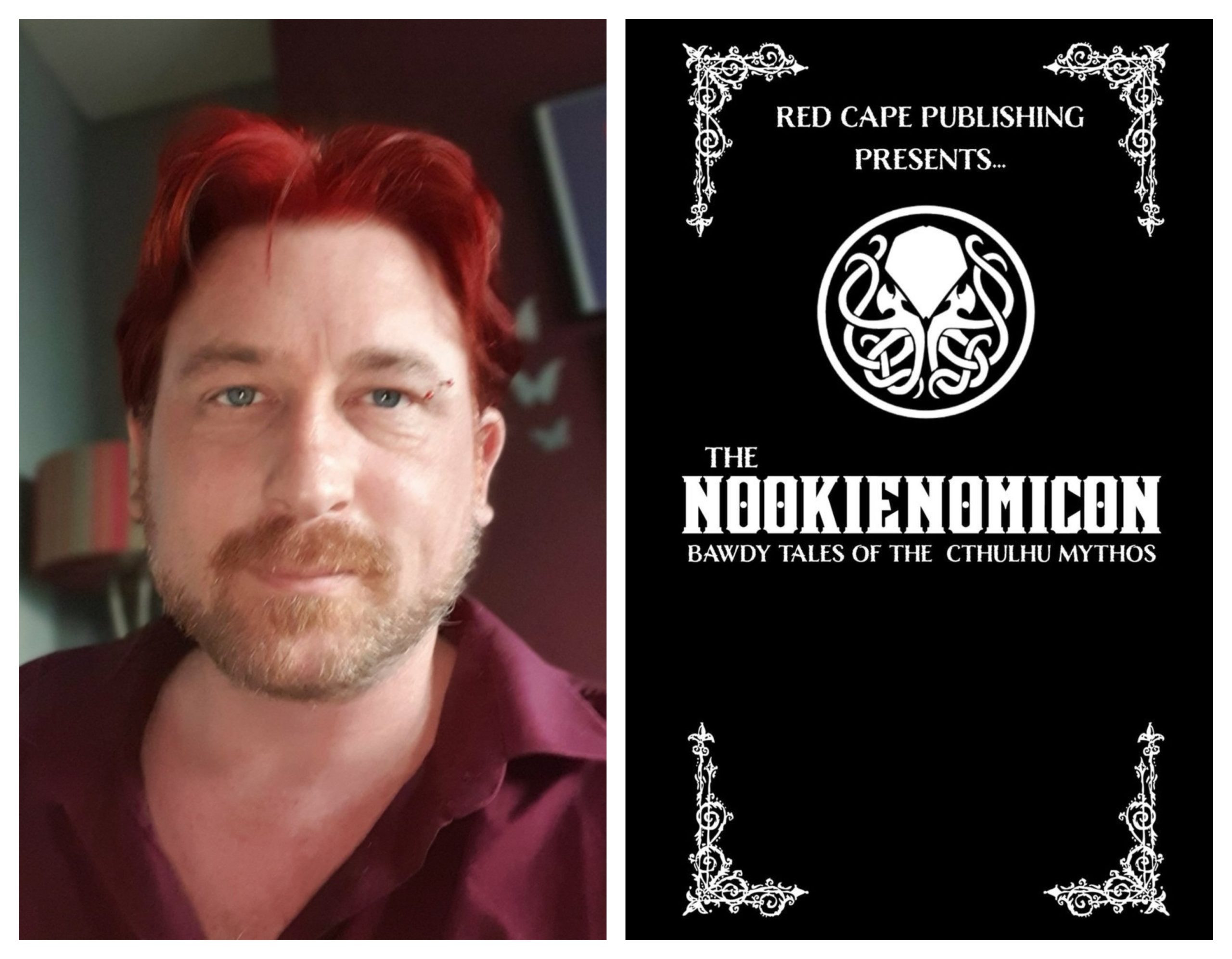
Callum Pearce is a Dutch storyteller, originally from Liverpool. He is a fiction writer published multiple times across a variety of platforms. A Lover of the magical as well as the macabre. He lives in a foggy, old fishing town in the Netherlands with his husband, a couple of cat-shaped sprites, and a trickster god in the shape of a dog.
Featured in lots of anthologies or online with stories for adults and young people. He has also written several factual articles for an LGBTQ+ lifestyle and a music website. Check his pages for things that are available now, coming soon or free to read online.
Our friends at Eerie River Publishing introduced us to Callum for a one-on-one conversation about his work.
Thank you for talking with us, Callum! Tell us a bit about your love of all things dark and scary.
Horror has always drawn me in. Even the children’s programs I watched were better if they had some ghosts or vampires in them. When my older brother had to babysit us younger kids, he would get some of the horrors that are still my favourite, Nightmare on Elm Street, Child’s Play. It was easier to just let me stay up and watch them than have me be an annoying brat all night. They were more fun than scary though. One thing that terrified me was the scene of somebody drowning under ice in Omen 2. That scene stuck with me. I was more affected by books, they could get under your skin a lot more. Clive Barker was a big favourite. Weaveworld had the added horror of being set in Liverpool where I was from.
When did you get the writing bug, and how long did it take for you to put your work out there for the public to read it?
I have always written. When I was younger, I moved around A LOT so I always ended up losing work I’d done or never finishing things. The urge to write stayed even though I suspected I would never do anything with it. In my thirties, I got married and life became more settled so I was able to focus a bit more.
I wrote a couple of articles for an LGBTQ+ lifestyle website that were well received. Even then, I didn’t dare share them with friends. The same year, I saw that the excellent Bold Mom website had a horror competition. As the competition was based on votes, I was forced to share with friends and basically come out as a writer. I placed quite highly in a competition with lots more experienced writers and enjoyed sharing my work. Then I started sending stories out to publishers and getting acceptances. Almost immediately, I was invited to lots of group projects with other amazing writers. Suddenly, it was a full-time job.
That is the dream for so many! Congratulations! Tell us all about your work and where we can find it?
The best place to look is my website. I’ve split the site into three sections so that you can look at all of my work. Otherwise, on the main page, you can choose just to see my work with LGBTQ characters and themes, or just my work for young people. We are currently promoting The Nookienomicon. A group of amazing Indie writers and myself had the idea brewing for a while. Last year we decided to get on with writing it together. The Nookienomicon is a crossover between the old, bawdy, British comedies of the 70’s and 80’s and Lovecraftian horror. I worked with some of my favourite people and some of the best horror writers on the indie scene. It was nearly impossible to suggest edits for the other chapters as I had to keep stopping to giggle at the ridiculousness of the brilliant stories.
That title alone is making me giggle! On a serious note, we are asking our featured authors if they’ve ever had to face homophobia or hate either in the writing world or in their personal lives. We’re hoping your success stories will help other authors feel more comfortable bringing their own work forward as you did.
In the writing community, absolutely not. There is a kind of idea that some have that people who write horror must be creepy and weird. Since I started taking my work seriously, about three years ago, I’ve met some of the most supportive, kind and brilliantly talented people you could ever wish to meet on the horror scene. Many I consider good friends.
In the real world, quite a lot. I worked on the gay scene a lot in England and was very open about my sexuality. Staggering around in crop-tops, stilletos and make-up means that you don’t have to trouble yourself much with Coming Out but it also brings some unwanted attention. I was gay bashed, harassed in public, harassed by neighbours. Most of the time, it just encouraged me to be more me. Eventually I got tired of it and moved from England to the Netherlands. They had been getting used to LGBTQ+ people and equality a for bit longer. In the long run, it just pushed me to be as fully myself as I could be in defiance.
Do you write queer characters into your stories?
I almost always have queer characters. In both my adult work and work for young people I think visibility is essential. Also having a range of queer characters. When I was growing up, LGBTQ+ representation was terrible. In films, LGBTQ+ people were mostly to be feared, pitied or laughed at. We either didn’t exist in the worlds created at all or we were thinly drawn, sinister or pathetic characters. You had to dig to find more rounded depictions.
In The UK when I was growing up, we had section 28, too much to go into here. But it was basically the US “Don’t say gay,” type of thing or Russia’s laws against “Promoting” non-straight sexuality. It made things very difficult for young LGBTQ+ people to hear about people like themselves and for teachers and carers to know the right way to support them.
It must have taken courage to write queer fiction after the abuses you suffered in your younger years. Have you discovered any great online resources for LGBTQIA2S+ writers that you’d like to share?
I haven’t really, I’ve followed a few LGBTQ+ pages on Twitter but not many for the stuff I write. The ones I follow only seem to promote love/sex stories that bore me a little. But then I haven’t really had a proper look and will happily take suggestions. The publishers I work with all actively support their LGBTQ+ writers and engage in pride events so I haven’t found it necessary to look too far.
What would you like to say to any budding authors who are reading this?
Just some advice for people who are toying with the idea of writing and haven’t jumped in yet. Jump in. Write things and send them to publishers. Join writers groups and talk to other storytellers about your work. If you can take constructive criticism then you can only keep improving.
Tell us about your next WIP, or anything else you’d like our readers to know about your work!
I have several adult, group projects that I have worked on this year. They will slowly come out over the next few months. Whilst they come out, I am focussing on the publishing side with House-of-loki.com. House of Loki is an imprint of Nordic Press focussing on stories for young people, something I care a great deal about. So I’m very busy with that at the moment and writing some things for the projects we have there. The first anthology we have coming out is a horror and I still include LGBTQ+ characters in my stories of course. The Loki part is named after both the trickster god and our beautiful rescue dog.
Thank you for taking the time to chat with us and share your experiences as a queer horror author for Pride Month!
About The Nookienomicon – An Anthology presented by Red Cape Publishing
“Cor, look at the tentacles on that!”
Two golden ages collide in this celebration of cosmic horror and classic British comedy.
Before the Karma Sutra there was The Nookienomicon, a book so insidious that it brought more than mere titillation… it brought terror!
Follow the path of madness wrought by this dreadful tome from the Hyborian Age to the present day as it spreads its influence, and its tentacles, throughout history. Join Kolon the Barbarian, Annie Mater, the insufferable Professor Feeley, and a host of other bungling characters as they strive to halt the influence of the book and the abominations it summons.
From the gambrel-roofed streets of Arkham and the decaying wharves of Innsmouth to Paris, Spain and the dusty halls of hallowed British institutions, one thing can be certain, wherever the Nookienomicon is found, it will bring insanity and hilarity.
Here’s a link to the cheeky launch party for the Nookienomicom on YouTube!
Eight side-splitting and sanity-shredding tales of the expanded Cthulhu Mythos by: Ella Ann, David Green, S.O Green, Chris Hewitt, Tim Mendees, Beth W. Patterson, Callum Pearce & Robert Poyton
Follow Callum Pearce:
We hope you’ve enjoyed our interviews with these amazing authors, but wait, there’s more! Members of the Grimoire staff have some book reviews to share from more authors celebrating Pride Month! Read on for our awesome suggestions!
Waif by Samantha Kolesnik
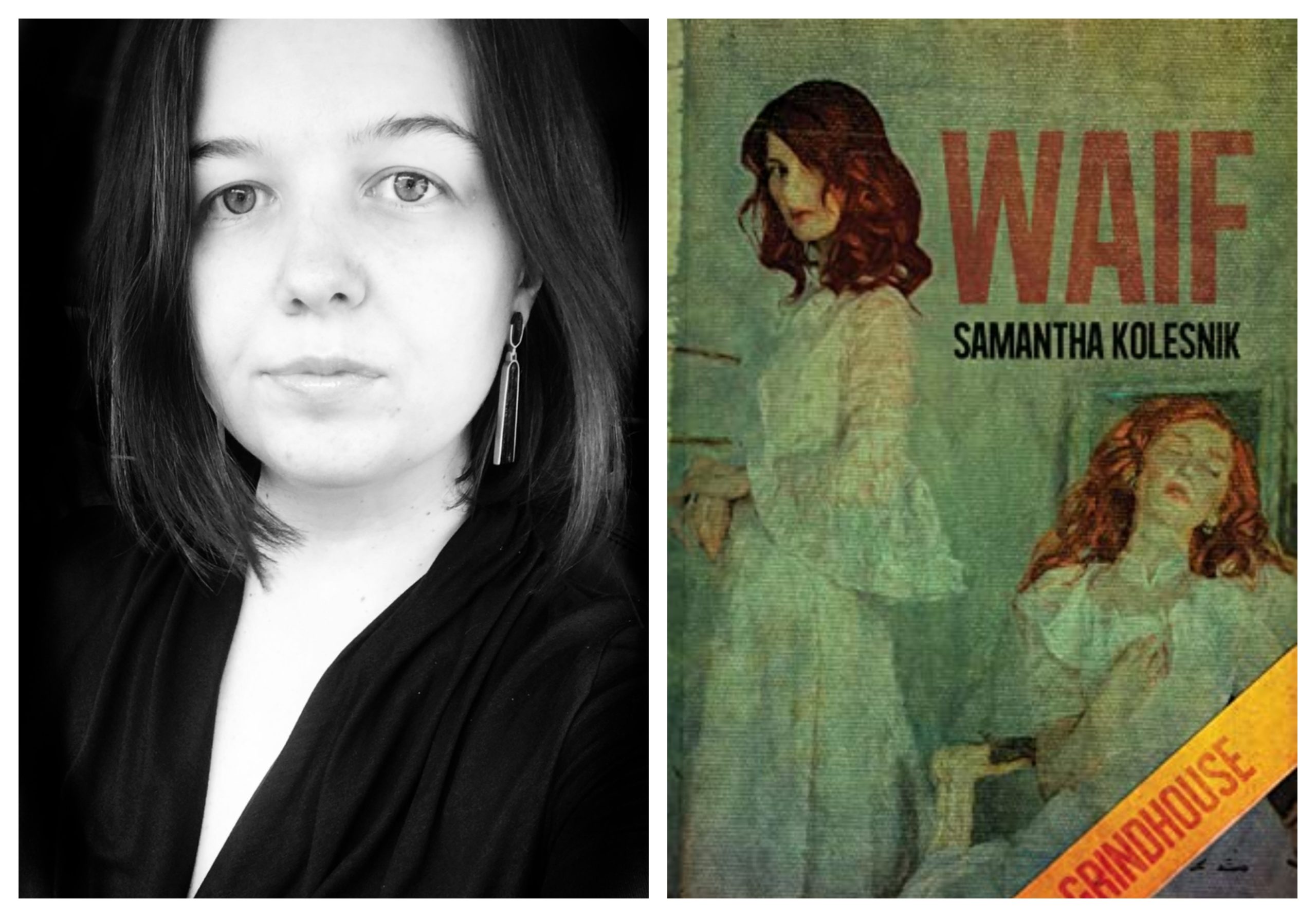
As a two-time Splatterpunk winner and a Bram Stoker nominee, Samantha Kolesnik is an undeniable talent in genre fiction. Brian Keene (The Rising) ranked her debut novella True Crime alongside Jack Ketchum’s iconic The Girl Next Door, saying it had “the power of a nuclear bomb.” Kolesnik’s follow-up, Waif, offered something entirely different: “a lot more surreal, and certainly more grotesque” according to Horror Oasis. In addition to writing novellas and short stories, Kolesnik edited the anthology of vacation horror Worst Laid Plans (for which she received the Stoker nomination), and she also volunteers at GenreBlast Film Festival, focusing on documentary and LGBTQ+ screenings – both of which go some way to explain her novellas’ themes.
In Waif, dissatisfied, downtrodden Angela finally snaps when her husband’s abuse turns physical. By chance, she encounters the man of her dreams at the grocery store and eagerly reveals her new desire to her husband. Humiliated but stubborn, he decides to undergo extreme, barely legal surgical procedures in order to alter his body and become the man Angela wants. However, the only surgeon willing to comply wants more than money in return, and Angela quickly becomes embroiled in the intersecting worlds of human trafficking, extreme body modification, and radical queer gangs.
Kolesnik covers a lot of ground in such a small book. Angela’s self-worth (or, indeed, lack thereof) is intimately explored. The way she makes excuses for her husband’s behaviour – how she clings to an outwardly perfect, middle-class existence – and, eventually, how this pressure fans the flames of her fixation are painfully believable. You almost resent her, while at the same time understanding the trauma she has suffered. Consumed by desire for a stranger, she lurches from one unhealthy mindset to another: from accepting abuse as the price to pay for an otherwise comfortable life, to an obsessive pursuit of a relationship that could never be. Then she meets Reena and Jameson, two women intimately involved with the aforementioned surgeon, and Angela’s carefully repressed sexuality reawakens.
The novella is most powerful at its darkest moments: obsessions, weeping sores, and implied castrations. At its best, it puts one in mind of the Soska Sister’s American Mary, which tackled similar themes from another angle. Here, we bear witness to a housewife, at last, challenging the status quo she long ago accepted. Kolesnik understands Angela’s flaws and never offers excuses, but she does allow space for self-discovery and -acceptance. The fraught depiction of the central relationship and moments of body horror reminiscent of Cronenberg’s The Fly overshadow an admittedly rushed final act, but Waif poses many important questions, none of which has an easy answer. -Reviewed by Isabelle Ryan
Dirty Heads by Aaron Dries
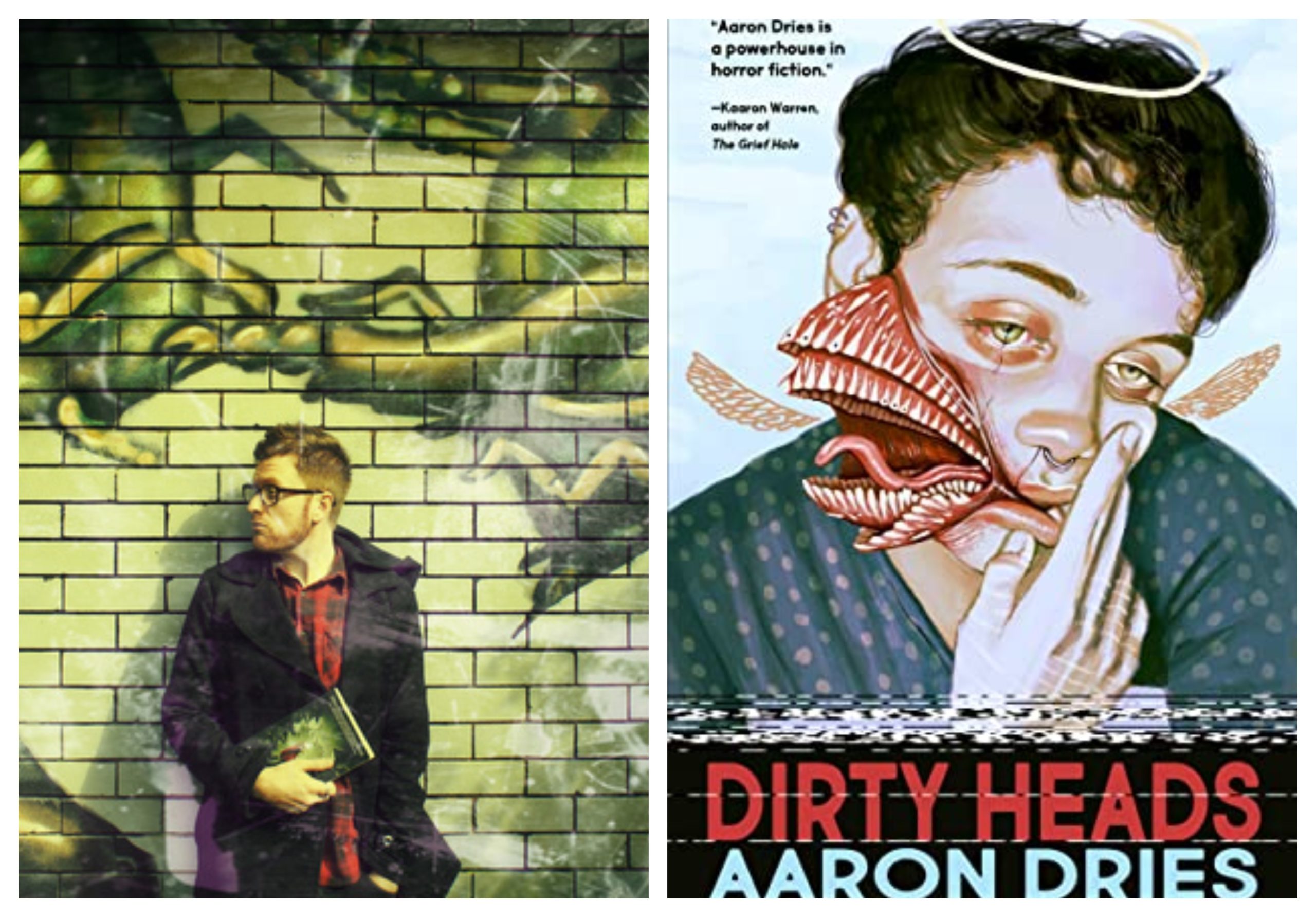
Since his award-winning 2011 debut, Aaron Dries has written six books, with a seventh on the way this year. Born and raised in New South Wales, Dries has tried everything from delivering pizzas to working in a kitchen, but he finds creating stories to be the most rewarding. He has been praised by everyone from Mark Allan Gunnells to Mick Garris; they called him “a master of emotional horror” who writes “beautiful and brutal” stories, respectively. It is not difficult to see why. From the extreme psychological horror of The Fallen Boys to Dirty Heads’ cosmic coming-of-age horror, Dries offers a fearless catalogue of compelling cruelty, with an undeniably human heart.
Dirty Heads opens with 19-year-old Heath, who stands on the threshold of the 21st century. Since eluding foster parents and the police, Heath has been homeless, making do with what little food he finds in trash cans, and what little money he makes meeting men in public toilets. Now, he is heading back to his hometown, finally ready to confront a terrible memory – a memory that begins with the discovery of a pornographic magazine in 1994. Things immediately begin to go wrong for Heath: his cat goes missing; his dad never returns from work, and the girl of his dreams thinks he might be gay. His love of movie monsters and VHS box art ceases to be a refuge, and Heath is forced to confront not only himself, but also the monster that has just awakened.
Dries expertly combines cosmic horror with a coming-of-age narrative, tackling a teenage boy’s sexual awakening, and the supernatural monstrosity his inner conflict brings to life. Crucially, his monster is not born of his queerness. Rather, the shame society has forced him to feel (even before he knew the words to describe himself) brings the monster out. From scaremongering AIDS PSAs, his dad’s casual homophobia, and the specific target school bullies have placed on him, Heath is surrounded by negative messaging. It is so ingrained in him that by the time he realises, it is too late. Ashamed and distrustful, he rejects support and compassion. The cosmic whirlwind of tragedy depicted in the novella only confirms his suspicions, pushing him towards the danger he thinks he deserves.
Dirty Heads takes time to establish Heath and his family, to paint a picture of this thirteen-year-old boy’s life before the monster appears. The novella is deftly paced, revealing the monster gradually through inner monologues and supernatural, almost magical realist phenomena. The eventual confrontation is a revelation, oozing and pulsating with cosmic terror. Through it all, Heath remains a compelling figure. His struggle and pain form the human heart at the book’s core. Dries’ grasp on this world and its focal occupant makes for a gripping read, one that works on multiple levels. -Reviewed by Isabelle Ryan
Fen by Daisy Johnson
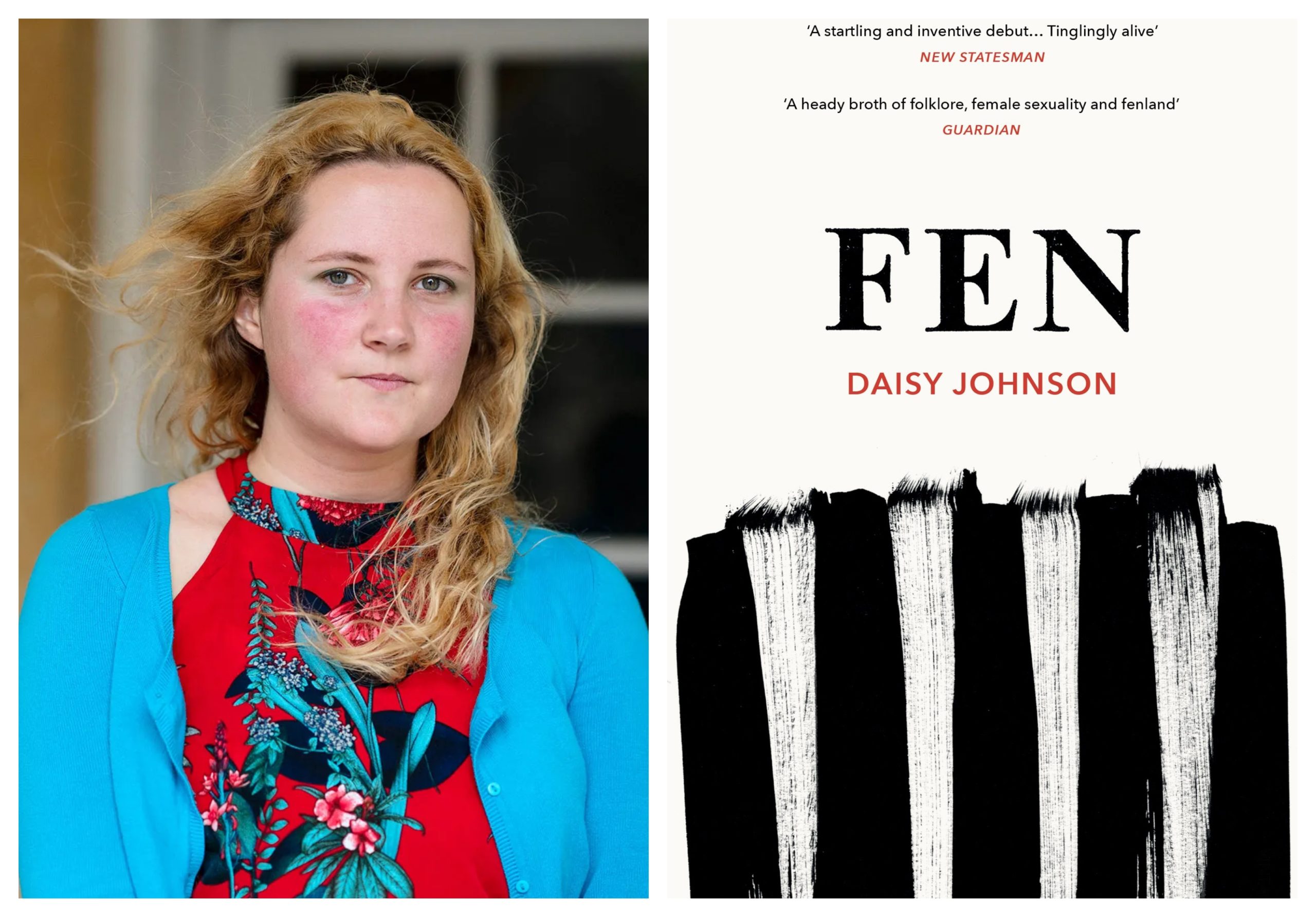
In Fen, a collection that has led critics to hail Johnson as the new Angela Carter, all of the protagonists are female, and the place is a major character, as well as the catalyst for most of the plots. The East Anglia fenland is portrayed as ever-shifting, treacherous, and uncanny, leaving a mark on its strange inhabitants. Language is an important aspect as well: there are veritable “language battles” to be fought, and the protagonists often find their own words invaded, changed beyond recognition, often as a consequence of men’s actions and violence.
Perhaps the most shocking Fen story, A Bruise the Size and Shape of a Door Handle, describes the relationship between protagonist Salma and her terrifying father, as well as the blooming romance between her and Margot, one which seemingly causes the house Salma inhabits to experience feelings of intense jealousy which threatens both young women. Johnson’s writing, her metaphors, and clever associations reveal each story’s secrets and full implications in tiny steps, and lovers of weird fiction will be hooked instantly because of the addictive power of her voice. Fen is a volume in which women turn into eels, deal with ill omens, devour sailors, have to cope with loved ones being turned into a zombie or can become fluid at will, but Johnson’s unique brand of Gothic horror, magical realism, and gallows humor often come with horrific realizations. “Damned if you do, damned if you don’t” is an apt descriptor for the fraught existence of her characters, but the journeys they undertake will often leave readers with a sense of frightened awe. Reading Daisy Johnson is like having to decipher an elaborate language game, only to realize that it was used, like a lullaby, in order to caution, redact and realign the cruel, oppressive architectures of reality itself: the things in life we often wish we could avoid but which change us in unexpected ways. -reviewed by Mihail Baltateanu
More Book Reviews
If you’re asking yourself, “Does Stephen King really need more book reviews?”, the answer is no – he really doesn’t. As one much more published and well-established reviewer once said,… Grady Hendrix is turning out to be a very entertaining voice in the horror lit community, and for me, it’s not hard to see why. With his hybrid of dark… Night Tastings: Part One: The Ingress is the first part of a trilogy of books by new author, Bervi Adams. Set in the 19th century, Night Tastings: Part One introduces… If you’ve never read any of Grady Hendrix’s other books, you might find Horrorstor’s mash-up of comedy and horror slightly disconcerting. It blends the main character’s bleak and oftentimes sardonic… If you are not familiar with Danny Torrance, then you have inadvertently deprived yourself of experiencing an icon of the beloved horror genre, Stephen King’s The Shining. As a fan… Published while he was still in college, Bret Easton Ellis’ debut novel Less Than Zero (1985) established themes of isolation and excess still present in his work today. The narrator,…Bag of Bones Book Review – A Classic Stephen King Horror Story
Why MY BEST FRIEND’S EXORCISM is One of My Favorite Horror Books
Night Tastings Part One: The Ingress by Bervi Adams – Book Review
Horrorstor (2014) Book Review – All The Charm of Ikea Minus the Meatballs
Doctor Sleep Book Review – Stephen King’s Sequel to The Shining
The Shards (2023) Book Review | This Means Nothing To Me
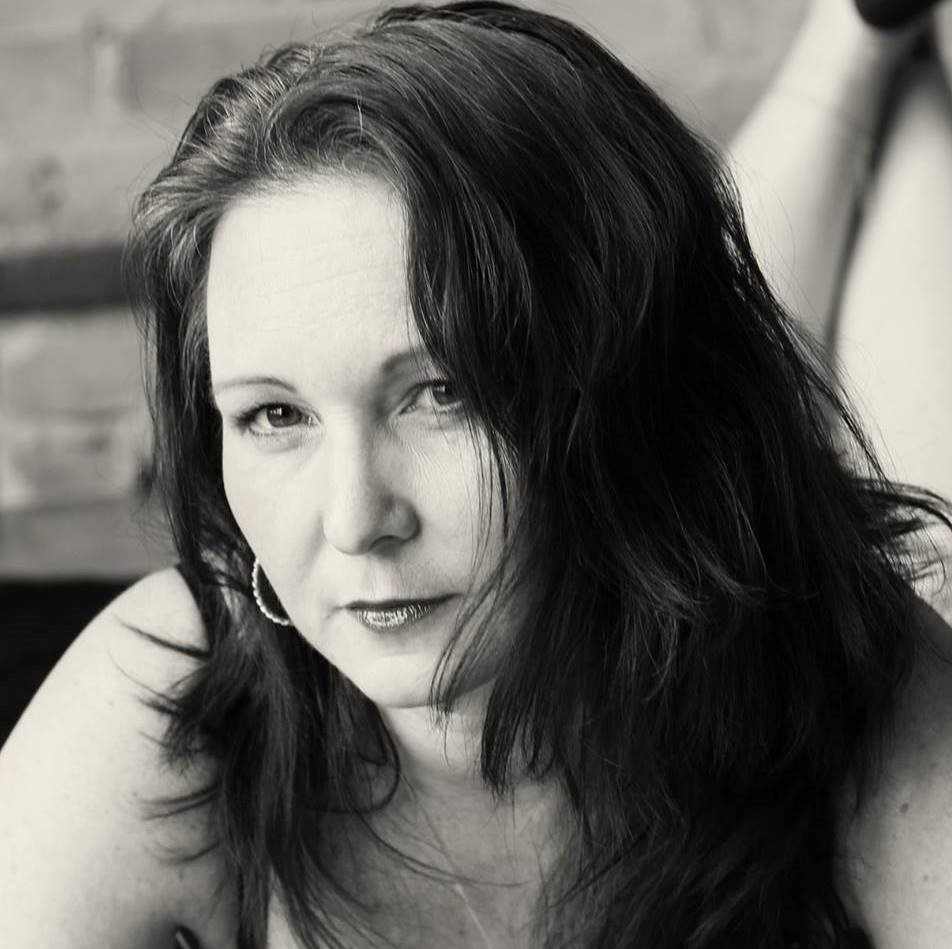
Kate’s love of all things dark began as a child and deepened when she realized what being an adult meant. She was born with a pencil in her hand and loves nothing more than writing horrific stories to tantalize her inner demons. Kate lives in Hamilton, Ontario Canada with her husband and her boys, stirring up trouble wherever she can.
